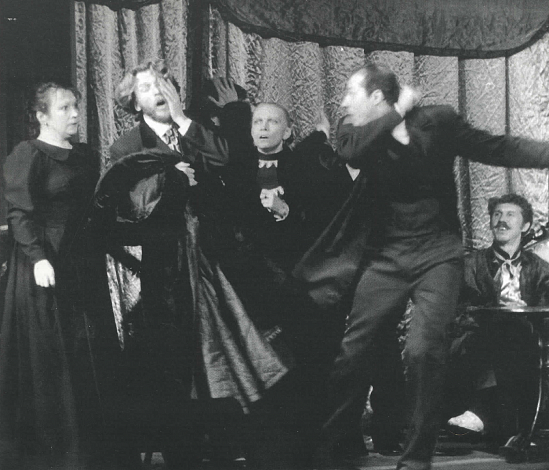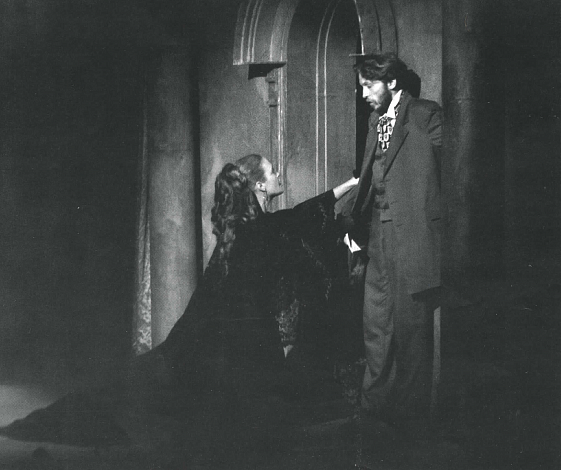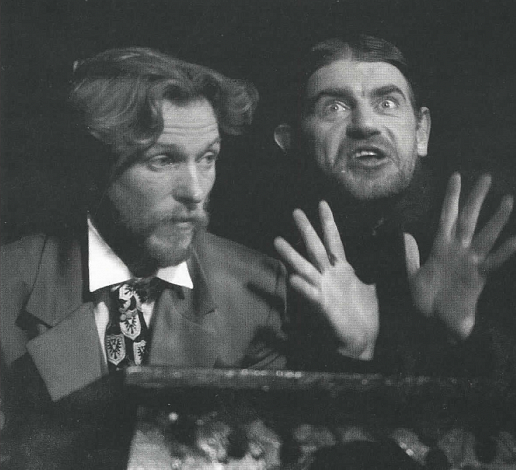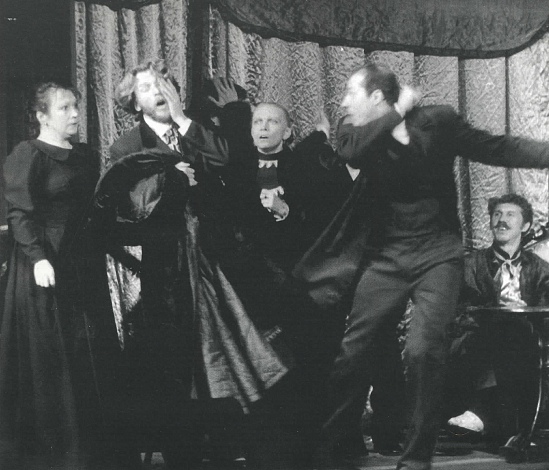| Director: | Sergei Zhenovach |
| Set designer: | Yuri Galperin |
| Composer: | Gleb Sedelnikov |
| Prince Lev Nikolaevich Myshkin: | Sergei Taramayev |
| Parfen Semenovich Rogozhin: | Sergei Kachanov |
| Lukian Timofeevich Lebedev: | Vladimir Toptsov |
| Alexei, servant at Epanchins: | Nikolai Serebrennikov |
| General Ivan Fyodorovich Epanchin: | Georgy Martyniuk |
| Elizaveta Prokofievna Epanchina: | Nadezhda Markina |
| Alexandra, their elder daughter: | Larisa Bogoslovskaya |
| Adelaida, their younger daughter: | Elena Matveeva |
| Aglaya, their youngest daughter: | Anastasia Nemoliaeva |
| General Ardalion Ivolgin: | Lev Durov |
| Nina Alexandrovna, his wife: | Vera Mayorova |
| Gavrila Ardalionovich, Gania, their son: | Sergei Perelygin |
| Varvara Ardalionovna, their daughter: | Alexandra Nikolaeva |
| Kolia, their son, gymnasia pupil: | Nikita Tatarenkov |
| Nastassia Filippovna Barashkova: | Irina Rosanova |
| Afanasy Ivanovich Totsky: | Gennady Saifullin |
| Ferdyschenko: | Sergei Batalov |
| Ivan Petrovich Ptitsyn: | Vladimir Ershov |
| Daria Alexeevna: | Vera Mayorova |
| Keller: | Andrei Khvorov |


Director Sergei Zhenovach presents the unique theatre project — three productions based on Dostoevsky's «The Idiot»: «The Shameless», «The Poor Knight», «Russian Light». Zhenovach's idea differs completely from all the previous theatre versions of the novel. His trilogy is the first attempt of the great novel stage interpretation without the cuts and text changes.
Going for three nights the prolongued «Idiot» assumes epic gravity so unusual in Dostoevsky. Loosing Dostoevsky’s swiftness, Zhenovach gains a great numbar of esential details of Dostoevsky's plot, his themes and ideas squeezed by the author into the extraordinary structure of his novel. Perhaps, it is the clearest and the most transparent theatre Dostoevsky among all those stage versions I have seen before.
Boris Lyubimov, Izvestia:
... Zhenovach is tempted by an old temptation: he hopes to create the production-novel, to come close to the structure of the great style and to the last and the main questions. Thus people study foreign language, «plunging» into it. The theatre is plunging into the matter of literature, alien to stage, and tries to appropriate literary wealth. Roving in the labyrinth of prose, the directors are still trying to overcome natural narrowness of the theatre; in former times this narrowness of drama was called «the unity of action», in Dostoevsky's time people, following his example, began to interpret it as one thought supremacy. This unique stage thought had to be elicited from the novel after the destruction of its structure. This barbaric deconstruction, suggested by Dostoevsky himself, was the only way to put the novel into stage life. Zhenovach did not believe to the author. Equipped with the theatre experience of the whole century, he decided to risk. He followed the tradition of slow reading; as a matter of fact, he directed the tableaux viands, from time to time brightening his performance with the modest stage metaphors. He remained in the shadow or, using the favorite Dostoevsky's word, «effaced himself». He did not submit to the great prose, rather, he went with its stream...
Sergei Zhenovach comprehends the main problem of «The Idiot» in his own way. For him it is not the problem of «Russian light». Another, completely theatrical idea is visible through all three productions and, first of all, through Myshkin's character.; this idea or this feeling makes Zhenovach's intention integral and reveals the secret source of the director's inspiration. The theme of idiocy turns out to be a transformed theme of human illness and expulsion resulting in the banishment of «the positively good man» from the life circle. Probably, Myshkin's complaint or, rather, his rhetorical question to the Creator of this eternal and immovable order is the most moving intonation in this production...
Schools and ages of our stage got mixed up in «The Idiot» in the remarkably interesting way. Pupils and friends of Zhenovach and veterans of the Malaya Bronnaya Theatre play together. The new ensemble is created with evi¬dent difficulty, in constant fight with the convergence of interests and methods of stage being (Anatoly Efros' work was accompanied by the same troubles). Some act using «the vertical line» (in Grotovsky's terms); others do not even suspect its existence, performing within the limits of verisimilar theatre. The latter pronounce their lines with sincere feeling and paint vivid pictures of passions. In the best moments of the performance the actors meet and unite on the new level and the ensemble comes into existence; in prospect their acting ought to find this clarity, transparence and ease Zhenovach is looking for in his fundamental productions.
Sergei Zhenovach comprehends the main problem of «The Idiot» in his own way. For him it is not the problem of «Russian light». Another, completely theatrical idea is visible through all three productions and, first of all, through Myshkin's character.; this idea or this feeling makes Zhenovach's intention integral and reveals the secret source of the director's inspiration. The theme of idiocy turns out to be a transformed theme of human illness and expulsion resulting in the banishment of «the positively good man» from the life circle. Probably, Myshkin's complaint or, rather, his rhetorical question to the Creator of this eternal and immovable order is the most moving intonation in this production...
Schools and ages of our stage got mixed up in «The Idiot» in the remarkably interesting way. Pupils and friends of Zhenovach and veterans of the Malaya Bronnaya Theatre play together. The new ensemble is created with evi¬dent difficulty, in constant fight with the convergence of interests and methods of stage being (Anatoly Efros' work was accompanied by the same troubles). Some act using «the vertical line» (in Grotovsky's terms); others do not even suspect its existence, performing within the limits of verisimilar theatre. The latter pronounce their lines with sincere feeling and paint vivid pictures of passions. In the best moments of the performance the actors meet and unite on the new level and the ensemble comes into existence; in prospect their acting ought to find this clarity, transparence and ease Zhenovach is looking for in his fundamental productions.
Anatoly Smeliansky, The Moscow Observer:
Performance gallery
4 photo



